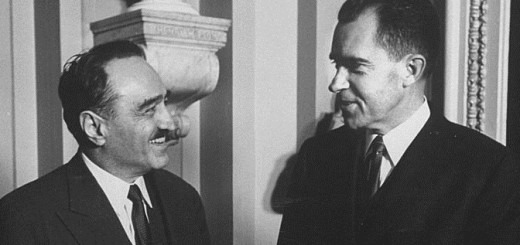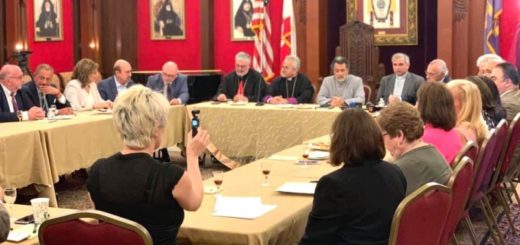Turkish Intellectuals Acknowledge The Armenian Genocide on TV Program
Last week, I transcribed the first portion of a lengthy video in which two Turkish Intellectuals are advocating the recognition of the Armenian Genocide by the Republic of Turkey. The discussion took place in 2015 on the 100th anniversary of the Armenian Genocide. The conversation between Erdogan Aydin and Aydin Chubukchu is in Turkish with English subtitles on the video. The name of the one hour and 37 minute-long program is Tower of Babel. The title of the program is “Facing the Genocide.” The Turkish discussion was translated and subtitled in English by Ohannes Kilicdagi, Ph.D.
Aydin Chubukchu: “Of course it [the Genocide] did not start in 1915. First of all, the Ottomans had an unjust order on the basis of nations and faiths. There was a dominating nation and several others that were dominated. The dominating nation [millet], which denoted religious groups at older times rather than ethnicities, was the Muslims. So, the dominating nation was Sunni Muslims. All the rest, Armenian and Greek, in the first place, were the dominated nations. This is the language of the state. It is not something that we make up today to defame the Ottomans. This is the description used by the official literature of the time. Moreover, there was a distinct term used only for Armenians, loyal nation (milleti sadika). So, Armenians, who had a privilege among other dominated nations, stood very loyal to the sovereign system. They were unarmed, providing all services for the state, etc. They had such fame. In fact, this is an unpleasant situation for a nation. No nation should be loyal; subservient to or dominant over another one. For us justice should be founded on equality be it yesterday or today. Equal citizenship, equal nations, fraternity of people…. There was a different standard; Ottoman standard. States like the Ottomans have such characteristics. They invade the land of others when they are strong. When invaded people awakened and the Ottoman state got weaker, they started to demand independence. Indeed, every Turk in Turkey should appreciate this. Turkey was founded by a struggle for independence. So demanding independence is a legitimate right for every nation: Greek, Bulgarian, Arab and Armenian…. These were wars of independence for sovereignty….”
Moderator: “Let us follow this line: the 1853-56 Crimean War, the 1839 Tanzimat Edict, the 1856 Reform Edict, the 1876 Constitution—the zenith of reform. Where were the Armenians at those dates?”
Aydin Chubukchu: “Those dates made it impossible for Ottomans to retain the old order based on the dominant-subservient nations. They had to issue Tanzimat and Reform edicts to be able to take credits from abroad. This is the critical point: after these edicts they would not call giavours [infidels] giavour. Giavour and Muslim would be tried in the same court. Sure, giavour is a bad word, we should not use it, but they called them so and this is the language that the ordinary man understands. Properties of those called giavours would not be confiscated. Accordingly, a relaxation came. But, this relaxation, instead of bringing peace to Armenians, unfortunately, exacerbated the tension. Why? Because the local power holders of the old, the dominant nation, started to provoke the Muslim people by saying: ‘what is happening? We are losing the sharia. Will the giavour be equal with us?’ Indeed, the state also connived these provocations. After a while, assaults against Armenians, especially by Kurdish, Islamists, Circassian organizations started. Upon this, Article 61 of the 1878 Berlin Treaty states that Armenians had been attacked and held the Ottoman state responsible for their protection. The Ottomans signed this. Moreover, let’s remember, against nationalist and Islamist prejudices. That the Berlin Treaty was prepared to protect the Ottomans. Otherwise, the Russians, who came until Yeshilkoy [Aya Stefanos], 20 kilometers near the center of Istanbul, would invade it. The Ottomans signed this, but, leaving aside informing [the Great Powers], they continued to let the attacks by mentioned groups. They did not implement the reforms either. Let us imagine ourselves for a minute as Turks in Bulgaria, Uyghurs or Muslims in Bosnia. What would we want, if we were there? Security of life and property. Nobody should attack or harass us. So, the state assured the Armenians of the time the same thing that we would want in Bosnia, but did not keep its promise. The Ottoman rulers, Abdulhamid being in the first place, did not want to acknowledge the rights of citizens as such. Moreover, they did not want to give anything to non-Muslims. This is the essence of the problem. …In fact, a just mind should defend the resistance of a people when their rights are attacked. Since we are captured by the mentality of slavery and an ideology that continuously exalts the state, we expect people to say nothing when the state does whatever it wants. But we do not follow the same logic for Bulgaria. If the victims are Turks and the oppressors are Bulgarians or Greeks then we do not accept it and defend resistance. We defend Bosnians against Serbs, rightfully, of course. But, likewise, when Armenians and Greeks demand their rights from the state, we say, ‘you rebels! You rebel against the state!’ Although this is a medical term and maybe should not be used in politics, but, it shows a schizophrenic, double personality. Justice necessitates that we should give people from different faiths and mother tongues what we want for those whom we associate with ourselves, in Bulgaria, Bosnia, Uyghur, Cyprus. Justice requires this. Kurds were used. But let us divide Kurds into two. One is the ordinary Kurds. The other is the lords, Kurdish powerholders, who aimed to get rich by extorting Armenian properties. Circassians were also used. They were driven from Russia by genocide. They lived through a heavy victimhood. The Ottoman state provoked Circassians against the Armenians in Turkey. It led them to take their revenge from the Armenians. In fact, we have numerous documents showing that some Circassians were used in this way. We should not praise or curse a people as a whole. This is what is called essentialism. All people have their good and evil, victims and oppressors. Collaborationists, disgraceful ones, exist in every people. We have to be sensitive to differentiate those among Kurds, Armenians Circassians and Kurds. Especially, we, who have a leftist worldview, should make this distinction more carefully.”
(Part III, to be continued in the next issue)







